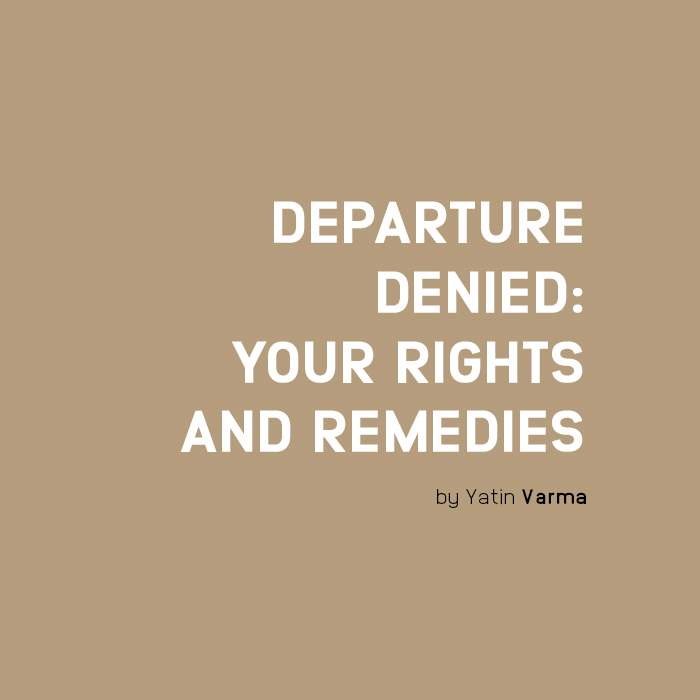In a globalised world where freedom of movement is considered a fundamental right, the concept of legally blocking someone from leaving a country might seem surprising. Yet, in Mauritius, as in many jurisdictions, this restriction- commonly known as objection to departure– is a necessary legal mechanism. When properly used, it protects justice, safeguards national security and ensures compliance with court processes.
This article explains the legal framework, grounds and remedies for objections to departure, with an eye towards individual rights and judicial fairness.
What is an Objection to Departure?
In criminal matters, anObjection to Departure is a legal restriction placed on a suspect or accused preventing them from travelling abroad until the case is resolved. It ensures their presence for investigations, trial, or other legal proceedings. Typically in Mauritius, an application for a Prohibition Order is made when a provisional information is lodged before a District Court. However, this order can be challenged or varied.
Legal basis in Mauritius:
- Section 15 of the Constitution protects freedom of movement including the right to leave Mauritius. However, it allows reasonable restrictions in the interest of: defence, public order, public safety, public morality or public health. If such restrictions are unreasonably prolonged without judicial supervision, the courts may intervene as held in Dookhy v Passport & Immigration Officer (1987 SCJ 196).
- Under section 13 of the Bail Act 1999, a senior police officer (Assistant Superintendent or above) or the Director-General of the Financial Crimes Commission(FCC) may request an interim restriction valid for 72 hours by certifying in writing to the Immigration Officer;
- The Police or FCC may formally apply for a Prohibition Order preventing a suspect from leaving the country under section 14 of the Bail Act. If the Court is satisfied, it may:
- Prevent the person from leaving Mauritius.
- Keep the order in force until the case is fully resolved.
In such a situation, the suspect or detainee must surrender their passport to the Passport and Immigration Office.
Remedies: Challenging or Varying a Prohibition Order:
A Prohibition Order is not automatic– courts must be satisfied that it is necessary. Individuals have a right to object at the time the application is made.
Variation of Prohibition Order (section 16 of the Bail Act):
You may apply to court handling your case to vary the order. Such an application is normally made before the Magistrate dealing with matters in Chambers. An application form normally needs to be filled in and supporting documents provided.
Grounds for variation include:
- Medical emergencies(yours or a family member’s);
- Property risk or financial loss;
- Other compelling personal circumstances.
The Court may:
- Allow temporary travel within a specific period;
- Impose conditions, such as travel only to specific countries;
- Allow travel on a restricted passport.
Note: The Director of Public Prosecutions (DPP) is usually consulted. If the prosecution objects, the court hears both sides before ruling.
In S.Peerthum v The District Magistrate of Rivière du Rempart (2009 SCJ 283), it was stated: To determine whether the variation of the prohibition order is justified, a balancing exercise has to be carried between the responsibility befalling the prosecution authorities and the convenience of the applicant and in Dookhy (supra) it was held: In considering alternative measures, the conflicting interests of the parties have to be weighed.
If the Variation Is Refused:
You can apply to a Judge in Chambers ( as Juge des référés) under Article 806 of the Code de Procédure Civil for a review of the decision.
What is a Report on Departure?
A “Report on Departure” is an administrative alert, not a court order. It is used when someone under complaint or investigation tries to travel abroad.
Here’s how it works:
- The Immigration Department alerts the Police or FCC if the person attempts to leave.
- Authorities can then:
- Record a statement
- Lodge a provisional information
- Apply for a Prohibition Order
- Or simply allow the person to travel
- Record a statement
While not as restrictive as a Prohibition Order, a Report on Departure acts as a monitoring trigger.
Final Thoughts:
An objection to departure is a powerful legal tool that must be used judiciously. Courts in Mauritius have the delicate responsibility of ensuring it is not misused or prolonged unfairly.
While the state has a legitimate interest in preventing flight, individuals must be able to challenge restrictions that infringe on their freedom.
The key is balance-between justice and liberty, public protection and personal rights.
Need legal help:
If you are subject to a Prohibition Order or Report on Departure, consult a legal professional promptly. Swift legal action can protect your rights and prevent unnecessary hardship.


Leave a Reply